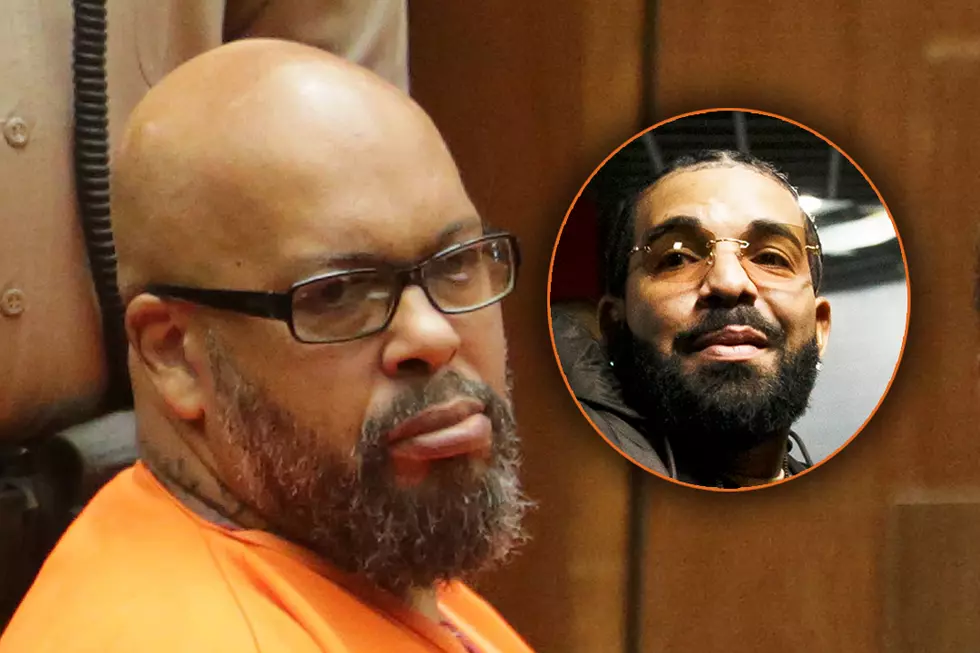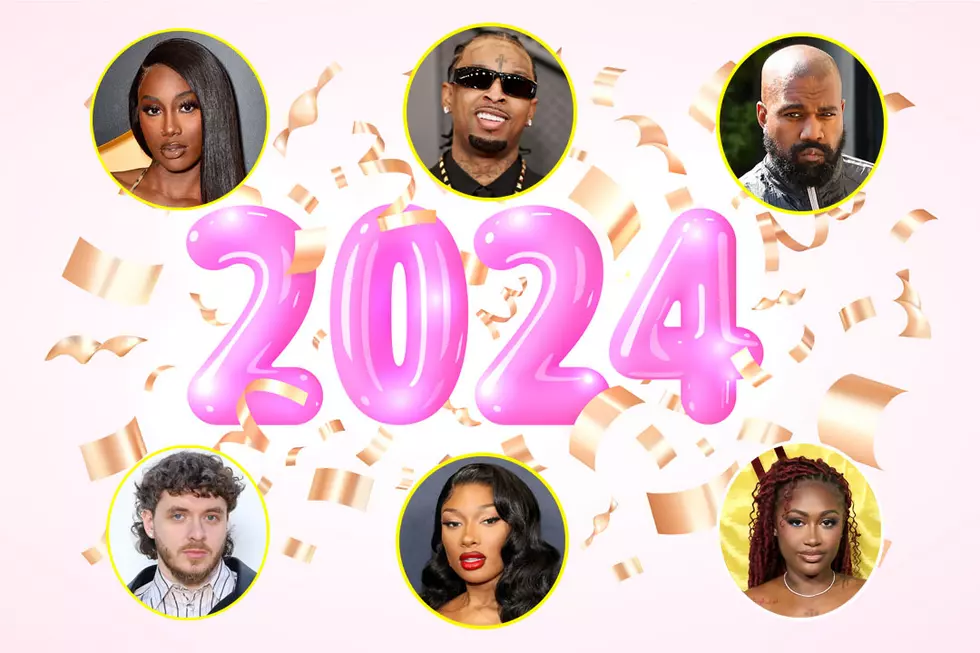
Drake, “My Next Album Is Going to be My Best Work to Date”
Trying to define Drake is not as easy as one would think. He’s a rapper, who also sings and pens songs for others. To his earliest fans, he’s an actor who started out on Degrassi: The Next Generation. To newcomers, he's the guy whose official debut album, Thank Me Later, dropped in mid-June and damn near went gold the first week. Sure the numbers fell short of the million copies that his Young Money captain Lil Wayne slung when he released Tha Carter III in 2008, but was the album a failure?
Not by any means.
You’d be hard press to tune in to the radio and not hear, Drake’s “Fancy” or “Miss Me” or Alicia Keys' “Un-Thinakble (Remix).” Chances are his Light Dreams and Nightmares tour is rolling through your city. And if you missed that, you’re sure to catch Drake on your television set slinging Kodak’s new Digital Easy Share cameras. Last night (October 5) he performed in New York City alongside Trey Songz to promote the product.
XXLMag.com recently caught up with Drizzy to talk about his new deal with Kodak, his upcoming R&B mixtape, his untitled sophomore album and how no matter what his endeavors he will always be a hip-hop artist at heart.
XXLMag.com: We bet you get a ton of endorsement deals thrown at you these days, how does Kodak make sense for the brand that you created?
Drake: For me, I choose to support things that I truly believe in. [Things] that fit my brand. First of all obviously I’m involved in the campaign with two individuals that I admire and respect very much, Pitbull and Trey Songz and Rihanna is involved in the campaign too. Obviously I have a lot of love for her. So that drew me in. I just think it’s great what they’re doing. Kodak is a traditional brand; they are the staple for film. For them to be doing this new Kodak— the digital easy share cameras it’s just great for our generation. It allows you to share your pictures and distribute them to all your different avenues, YouTube, Facebook, Kodak Gallery, and One Click. I love seeing technological advancement. To me it was a dope thing. I’ve never been much of a camera person, and I was like “Oh well now I can document more of my memories.”
Now you can live and hold the camera contrary to the line you spit on “Say What’s Real.”
[Laughs]. Exactly, contrary to the line. [But] I don’t know if I can do that still.
Can you clue us in to where you are in the process of recording your sophomore album?
Well yeah, I learned a lot from putting Thank Me Later out. I learned what worked for me— I wouldn’t necessarily say that there were things on that album that didn’t work, but I learned what really worked for me, and what I loved and what the people loved. One of the best things is putting people around me in great positions. I got [Noah] “40” [Shebib] finally just financially, mentally in a great place. Some of the best material that he has made to-date since we started working, came right after Thank Me Later was finished. He just happened to be in a great place right after the album, so I’ve been sitting on about five or six beats that are really, really good. And I’ve got some great raps. Boi-1Da now, Boi-1Da is in a great place as well.
Is there a name for the album?
Nah, it’s a little early. [Laughs].
But, we’ll see your R&B mixtape before that right? What can you tell us about It’s Never Enough?
It’s Never Enough. There’s raps on there, I’m, rapping on there a little bit. It’s like eight or 10 songs, free songs that people can rock with. I hope they enjoy the music. I released one song [“I Get Lonely Too”] yesterday.
Going back to the release of Thank Me Later; can you talk about the public’s high expectations versus the actual performance of the record?
I think the expectations had very little to do with Thank Me Later and a lot to do with Tha Carter III. I think that a lot of the expectations that I was pinned up against coming under Wayne had everything to do everything with the precedent that Wayne had just set. For me, I didn’t do that to myself. I didn’t put that pressure on myself, only because we’re at two different places in our career. That was very much my first album and I still got a lot of growth and work to do to be able to sell a million copies in my first week. For me, I think we exceeded expectations; we did a little under 500,000 the first week. To me, that was pretty incredible. I just got my platinum plaque the other day.
Congrats.
You know people love the record; the shows are going phenomenal, I hear the stuff on the radio. So I’m very pleased with how Thank Me Later turned out. Do I think that I can do better? 100 percent. Am I’m going to deliver? Yes, for sure. My next album I feel like is going to be my best sonic work to date. I think that musically I’ll be able to take it to another level now.
The next single is “Show Me A Good Time,” right?
Yeah.
On that song you flex so much hip-hop muscle. You name-drop A Tribe Called Quest, Dilla, O.D.B., and you did “Think Good Thoughts” with Elzhi and Phonte in the past. Will you ever return to that grassroots, underground hip-hop aesthetic in your future music?
Yeah. I spoke very publicly about working with Phonte again on this next record and I really, really want to. I’m working with 9th Wonder on this next album as well. I think that because me and Wayne took hip-hop to such a melodic, hit-record place, I think a lot of people are trying to recapitalize on that boom-bap hip-hop sound. I hate following what everyone else does. I think I got a pretty great balance and a pretty great formula that I’m working with right now. Me and 40 have had long, long discussions about where we are going to go with the sound of any music coming up in the future. I‘ve got some pretty good ideas. I’ll return there, but in my own way.
How so?
I’m not just gonna do exactly what so-and-so is doing right now. I’m very observant and I’m watching the moves that people are making with their careers and the projects that they have coming up. I just want to do my own thing and stay on my own path. It would be impossible for me not to incorporate that element. As you see I did on “Show Me A Good Time,” and I’ll probably do it again on this next album too. I just love that brand of hip-hop so much, that’s impossible for me to just leave it alone completely.
But as you grow, and you branch out into film and other genres of music, does it become difficult to just be a hip-hop artist?
I mean it wouldn’t be difficult. If I just said, “I just wanna be a rapper,” you know I could. It’s more of a desire I have to— there are some people who come up to me and say, “I don’t listen to your rap stuff, I love ‘Sooner Than Later,’ I love ‘Brand New,’ I love when you sing. I love ‘Find Your Love,’ I don’t listen to rap.” To me, rap just can’t be the be-all and end-all. One thing can’t be the be-all and end-all. I want to branch out. I wanna get back into acting. Maybe they’re people who don’t listen to rap or R&B or music period, but they’ll learn to love me as an actor again. They’ll be like, “Oh I love your acting, I just don’t listen to your music.” I just feel like whenever you choose to do something new, there’s always a positive when you’re doing it right and doing it well. So as far as being a rapper, I love rap first and foremost. There is nothing more that I get a kick out of more than writing great raps. But at the same time I just dropped a rap album and I don’t want to oversaturate the market with a bunch of Drake raps. I want to take a break. I want to live some life so I have some creative things to come back and say to you. With that being said, in the meantime because I’ve always been a supplier of music for fans, for free. That’s why I choose to drop It’s Never Enough. — Rob Markman
More From XXL









